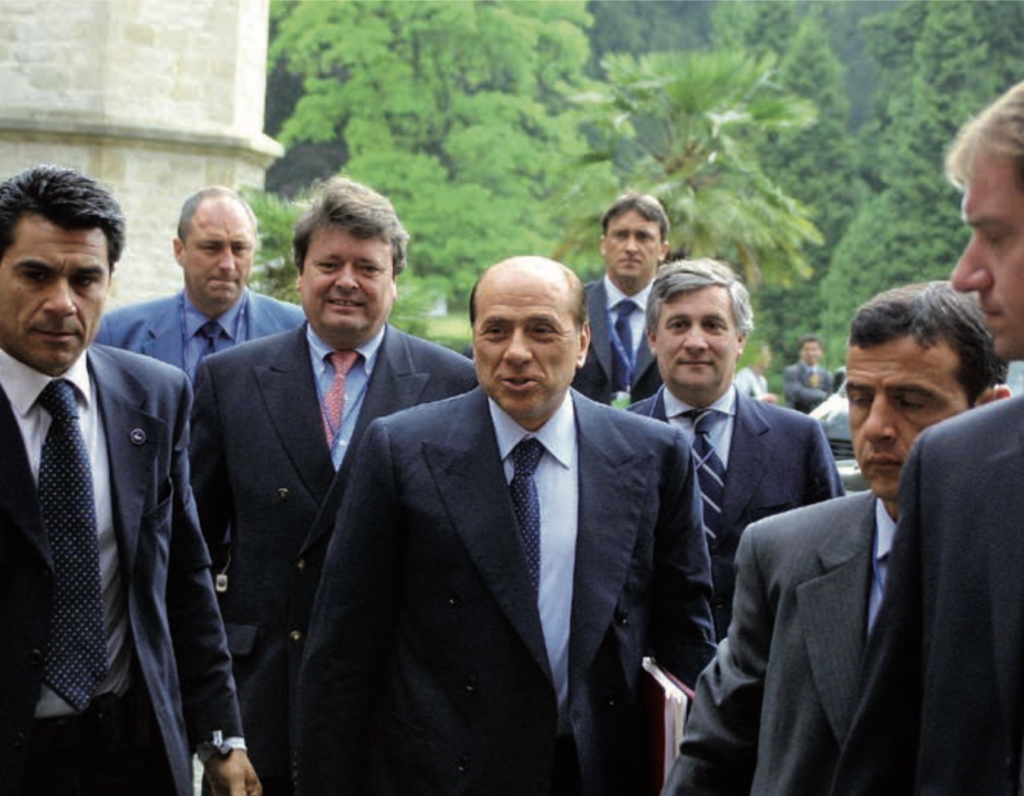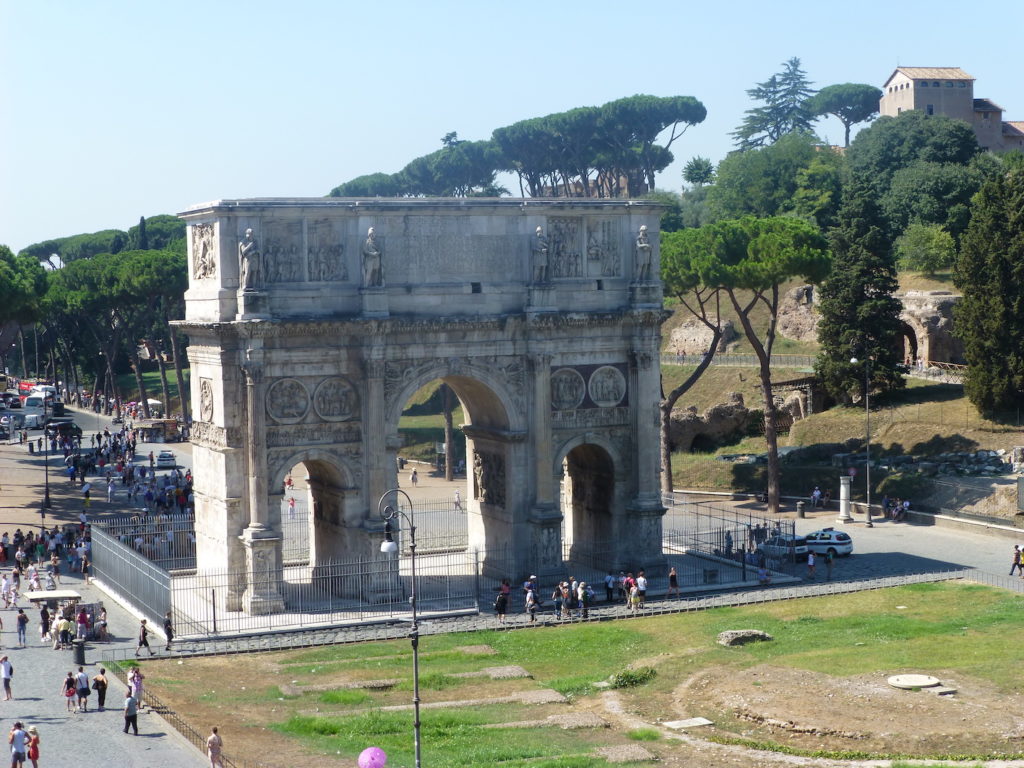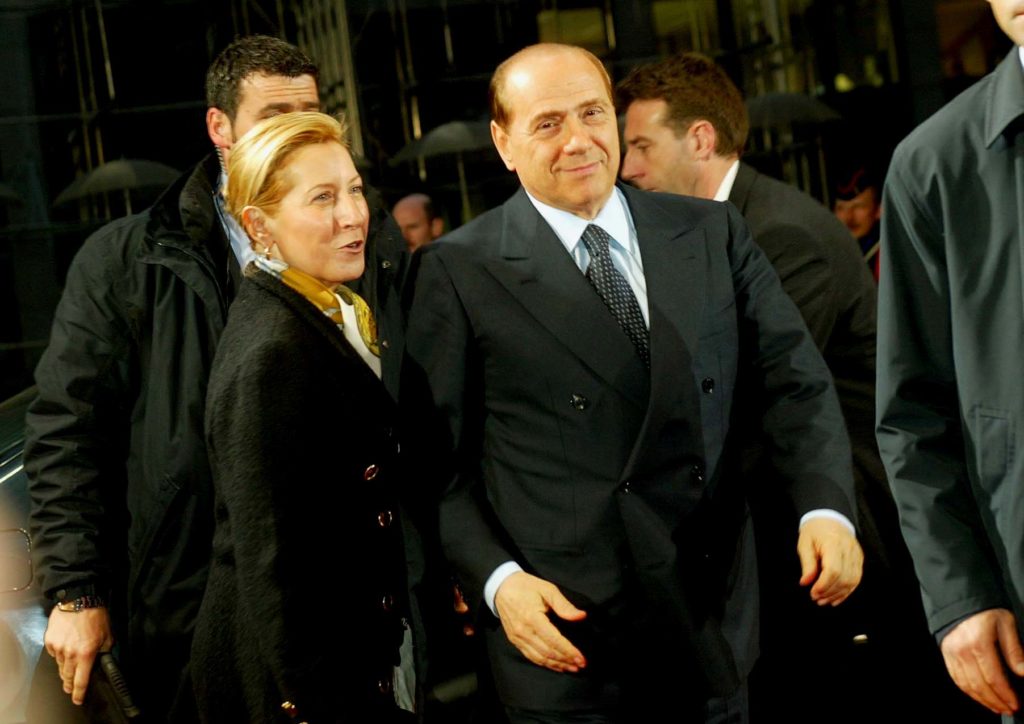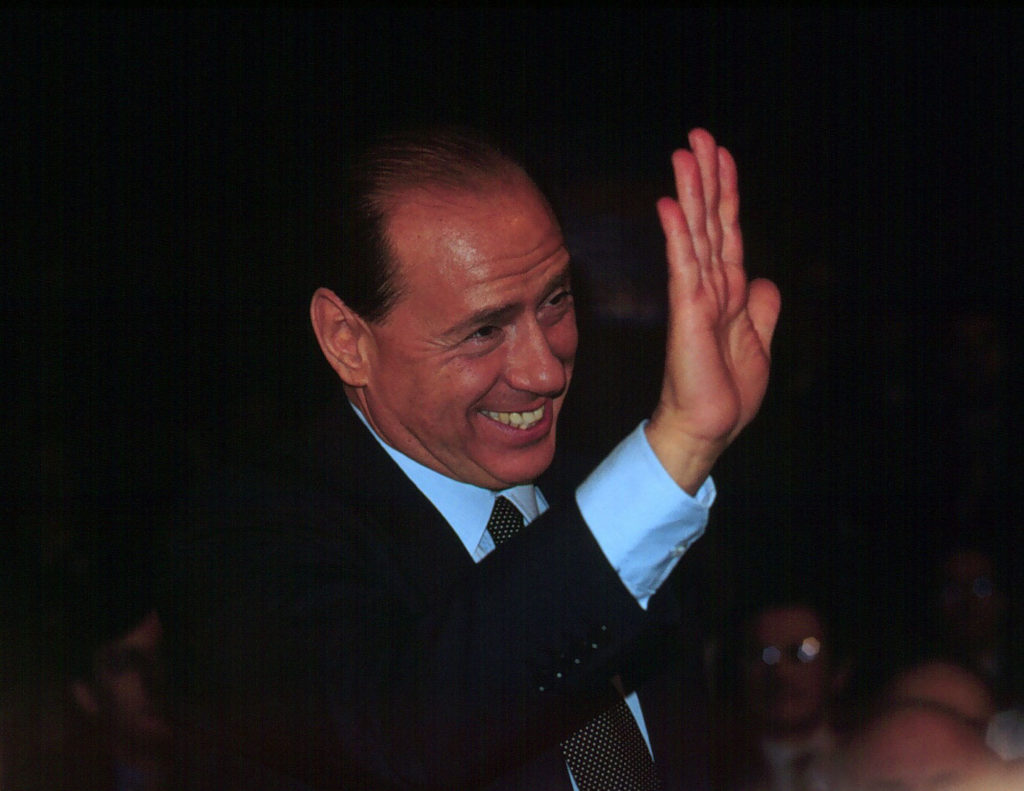It would undoubtedly be a cause of shock and alarm to see someone you believed to be dead turn up at a feast and take your chair. It certainly alarms Shakespeare’s Macbeth, when the ghost of the man he has had murdered, his former friend, Banquo, appears to him whilst remaining invisible to his wife and their guests. Well, it would upset anyone, wouldn’t it? Macbeth makes clear to his doubting wife how the experience is upsetting him:
“The time has been that when the brains were out, the man would die,
And there an end: but now they rise again
With twenty mortal murders on their crowns,
And push us from our stools”.
What would he have made of Silvio Berlusconi, Italy’s third longest serving Prime Minister and Machiavelian political manipulator?
The unexpected reappearance of the supposedly departed has been the theme of many a horror film and many a legend, especially in certain parts of Eastern Europe such as the Carpathian Mountains. As Lady Macbeth says, such tales “could well become a woman’s story at a winter’s fire”. Take Dracula, that wonderful 1897 creation of the Irish author, Bram Stoker, for instance. The book has inspired no end of films, with sequels galore, letting the toothsome Count come back to life so often that his crypt would need a revolving door and a willing servant to change and wash his shroud regularly. It’s a strange fact that people enjoy being horrified and frightened by the so-called “undead”. The tag-line for George Romero’s classic 1978 horror movie, Dawn of the Dead, was: “When there’s no more room in hell, the dead will walk the earth.” It’s a horrible notion and one with no logical justification, even in the movie.

THE COMEBACK KID RIDES AGAIN
When have you ever seen the dead rise up and displace the living? Until now. Well, not dead, in fact, but assumed to be a figure from the past, someone whose true place is in a history book, rather than a political chamber. Macbeth was upset because they “push us from our stools”. But what if they push us from our seats in the European Parliament? All stand, please, for Silvio Berlusconi, who at the age of 82 has re-entered mainstream politics as an MEP. Forced to step down as Prime Minister of Italy in 2011 as its economy went into meltdown, he has decided on a comeback, saying he had “a sense of responsibility to head for Europe, where there is a lack of deep thinking about the world.” Such an accusation has only carried weight since the arrival in Europe’s elected chambers of populists who proclaim simple answers for all the people’s ills. Sadly, Berlusconi may almost have a point when he says “In Brussels I will remain the sole levee against anti-European nationalism.” There remain others, perhaps better suited to such a role. Berlusconi certainly says he believes in Europe, almost as much as he clearly believes in Berlusconi. Who would have thought just a few years ago that people might one day see the man famed for his “bunga-bunga” parties as a bulwark against the march of anti-European populism? But is he? He wants to see the centre-right European People’s Party (EPP) group, to which his Forza Italia party belongs, create greater distance from the centre-left Social democrats by aligning itself more closely with the far right. He recently tweeted: “The EPP must leave the alliance with the Socialists and turn to the right, to the conservatives and the nationalists. I am convinced that even Orbán (Viktor Orbán, controversial Prime Minister of Hungary) and Salvini” (Matteo Salvini, Italy’s Deputy Prime Minister and leader of Lega Nord) “can enter this alliance to transform Europe into a Europe for growth.” He campaigned alongside Salvini to win a regional gubernatorial election in Abruzzo earlier this year for the neo-Fascist Brothers of Italy party, which is even further to the right than Lega Nord.
But cosying up to populists can have negative consequences, as Sebastian Kurtz, leader of the centre-right Austrian People’s Party, discovered when he assumed he could go into coalition with the far-right FPÖ leader, Heinz-Christian Strache, while reining in Strache’s more extreme politics, only to see his new partner caught in a sting operation that left him mired in an apparent attempt to let a fake Russian oligarch take over Austria’s biggest newspaper and fill it with pro-FPÖ propaganda. Mr Kurtz ended the alliance while Mr Strache resigned in tears. And if the European Peoples’ Party followed Berlosconi’s lead and drifted towards populism, there could be a political cost. “If they move any further right – and they’ve gone a long way – they we start losing those from the centre to ‘Renew Europe’ as they don’t want to be in bed with Fidesz and PiS,” according to former MEP Glyn Ford, who was at one time Deputy Leader of the Socialist and Democratic Group in the European Parliament and who wrote the book “Talking to North Korea”.
As he began a campaign to restore his centre-right Forza Italia party to the political forefront, Berlusconi told reporters that “Europe must return to being a continent ‘that counts’ and not one of ‘divided states’”. And yet he has campaigned alongside Matteo Salvini, aligning Forza Italia with Salvini’s virulently anti-immigrant and Euro-sceptic Lega Nord, thus strengthening Italy’s political right. Salvini has recently been making a point of upsetting France, accusing it of “stealing wealth” from Africa. He has also shared a political platform with Jörg Meuthen of Germany’s far-right Alternative for Germany (AfD) party. Salvini has tried to put obstacles in the way of Berlusconi’s return from the political wilderness, hoping that he would not need to ally his League with Forza Italia. Berlusconi was forced to give up his seat in the Italian Senate in 2013 following a conviction for tax fraud and a further conviction in 2015 seemed to many commentators to have put the final nail is the coffin of his political career. He also served a community service sentence, working in a retirement home, helping inmates with parlour games and sing-songs. It should have suited his talents as a former singer on a cruise ship. His ban on public office was overturned in 2018 when the Milan Appellate Court decided he had been “rehabilitated”. The ban would have run out in 2019 in any case.

ONE VISION, MANY VIEWS
He says he has a vision for Europe but it veers very close to populism, at least in part. When he announced his plans to contest the European Parliamentary elections, he made his position clear. “This time the European elections cannot be underestimated because Europe’s need for change is urgent,” Berlusconi said, “for the interests of Italy but also and above all for the role that Europe must return to playing in the world. The world today is a much less secure place than in the past, perhaps it has never been so dangerous since 1945. Today there is no longer a power that protects the global order.” Could this have been a dig at Donald Trump? His declaration on his party’s electioneering website sounds convincing enough: “The nationalists fight Europe in the name of our identity. They do not understand, perhaps they do not know, that Europe is our identity,” he writes, “it is the system of values and the lifestyle we are used to. Europe is the great Western culture, the one that built the cathedrals of the Middle Ages, created the music of Beethoven or Bach, Verdi or Chopin, the books of Dante, Goethe, Shakespeare, the philosophy of Aristotle of Saint Thomas, by Kant.” Reading it, one can almost hear the European anthem, Beethoven’s Ode to Joy, playing in the background, but it’s not the sort of Euro-enthusiasm that is likely to find many allies among the more nationalist parties represented in the new European Parliament. “The only thing that the Caruso of Italian politics seems not to understand is that the culture of Europe, and the institutions of the European Union are very different things,” commented Gawain Towler, Director of Communications with Nigel Farage’s Eurosceptic Brexit Party, which returned the highest number of British MEPs in the recent European elections. “One is watered by the range of cultures, histories and differences of the peoples and nations of Europe, and one seeks to co-opt these things whilst draining them of their vitality in favour of a one-culture-fits-all approach.” I have to point out that within the European Union, that would be held as very much a minority view. And the range of views espoused by Berlusconi sounds suspiciously like something Grouch Marx once said: “Those are my principles, and if you don’t like them…well I have others.”
LAMBS TO THE SLAUGHTER

Certainly, Berlusconi’s manifesto sounds moderate and reasonable – more powers for the European Parliament, a common foreign and defence policy, protecting Italy against unfair competition – but also includes an end to irregular immigration, giving Italy a leading role in Mediterranean affairs (including immigration, energy and infrastructure) and better respect for the environment. Berlusconi the green? It seems uncharacteristic, somehow, although he appeared in a 2017 video for the Italian League in Defence of Animals, urging people to “choose a vegetarian Easter” while hand-feeding five lambs he claimed to have saved from the dinner table. Lamb is the dish traditionally served at Easter in Italy. It annoyed Italy’s meat industry, which may well have been the intention: Assocarni, the lobby group of Italy’s butchers, called on advertisers to boycott Berlusconi’s TV channels and publications in retaliation.
But his green credentials seem somewhat cosmetic, however. Compassion hasn’t normally seemed to figure highly among his priorities, but maybe that doesn’t matter to voters. In any case, it doesn’t sit well with his party’s demand that no more EU money should be spent on immigrants. Salvini’s Lega Nord surprised everyone by taking more than 34% of the vote in the European elections. He was jubilant in victory: “It’s not just Italy,” he said, “it’s Le Pen in France, Farage in the U.K., it’s Hungary, Poland.” He may not be keen on an alliance in Italy with Berlusconi’s Forza Italia, but he believes the overall results will strengthen his position elsewhere. “I am counting on having allies everywhere to save the EU … to change its rules. We finally have to change after decades of bureaucrats and bankers’ rules.” He did not clarify what those changes might be, nor if Berlusconi will support them. Presumably he will. Berlusconi’s party won 8.8%, a slight drop in support but enough to send him to Brussels and Strasbourg. Even so, he is expected to see a drift away from Forza Italia in favour of Salvini’s Lega Nord and the neo-fascist Brothers of Italy.
NON-STICK, NOT FLAME-PROOF

Berlusconi can hardly avoid attracting attention and headlines by re-entering the political fray despite his colourful past and his dubious record in office. He was known as “the Teflon don” because the muck simply didn’t stick. Anyone who has ever owned a non-stick pan, however, will know that the Teflon coating can wear away with time. And even if many people have forgotten – or, in the case of younger voters, were unaware of -Berlusconi’s record, Italians deserted him in droves because of corruption scandals, diplomatic blunders on a grand scale (he reportedly called Angela Merkel an “unf***able lard-arse and also insulted the then leader of the Socialist group in the European Parliament, Martin Schulz, who went on to become President of the Parliament, by suggesting he should be cast as a concentration camp trusty – a prisoner who also serves as a guard – in a film about the Second World War. It made Schulz a hero and an icon of the Left) as well as stories of private sex parties. He has been cleared on appeal of having paid for sex with an underage Moroccan nightclub dancer, known as “Ruby the Heart-stealer” (real name Karima El-Mahroug) after the judge decided he could not have known for certain that she was only 17 and therefore too young (the age of consent in Italy is 18) and after twenty-five others who had attended his parties testified that they were merely “posh dinners”. He had originally been sentenced to a seven-year jail term. El-Mahroug admitted having attended one of his parties and having received money from Berlusconi but denies having had sex with him. His alleged affair with Ruby was not just about sex with a minor; he was accused of an abuse of power by putting pressure on the police to drop a shoplifting charge against her. Meanwhile, he is also accused of witness tampering in Milan, Sienna, Rome and Turin by allegedly paying those witnesses who said the parties had been innocent, classy events while keeping quiet about what really happened at his “bunga-bunga” parties. It has been suggested that Berlusconi paid out some €10-million in bribes to them. Even so, few people seem to believe the parties were candle-lit dinners, as the witnesses were saying, while one of the young women who claimed they were sex parties, 34-year-old Moroccan-born Imane Fidal, died in mysterious circumstances in March, alleging she had been poisoned. The autopsy report into her death is due to be published this July. She had claimed that women performed striptease dances at the parties in what Berlusconi later dismissed as “burlesque contests” and “theatrical events”.
ONCE UPON A TIME
Monsters do not just rise from the grave; like Dracula, they have to have some kind of back-story, a beginning; Vlad Dracul was a hero in Wallachia, now part of Romania. Silvio Berlusconi was raised in a middle-class household in Milan and evacuated with his mother to the countryside during World War II. His father, Luigi, was a bank employee. Berlusconi began his career selling vacuum cleaners but rose to riches in the construction industry, erecting some four thousand apartments in Milan in the 1960s. Using his profits from that, he launched a small local cable TV station. It was a success and he bought more channels, eventually founding his media group, Fininvest, in 1978, later setting up Italy’s first private nationwide channel, Canale 5. In 1984, judges in Turin, Pescara and Rome tried to close down Berlusconi’s channels, but he had become friendly with the then Socialist leader and Prime Minister, Bettino Craxi, who simply overturned the decision by reclassifying the channels as “legal”. It emerged many years later than Craxi’s offshore bank accounts were enriched to the tune of some 21-billion lira (€15-million) from Berlusconi’s Fininvest media group.
Ever ambitious, Berlusconi decided to try his hand at politics, forming his Forza Italia party in 1993. The following year he became Prime Minister for the first time. Losing to the centre-left Romano Prodi in 1996, he set about building a coalition of right-wing parties, making a lot of expensive promises to the electorate, such as higher pensions, more jobs and cutting down on crime. He was swept to victory, later claiming to have fulfilled most of his election promises during what turned out to be a turbulent premiership. When his opponents poured scorn on his claims he blamed a biased media.
RISING, MOB-HANDED?
What of the other allegation that dogs Berlusconi’s steps? He has always denied having links to organised crime, but when he entered politics he was helped by Mercello Dell’Utri, who is currently serving a jail term for his links to the Sicilian Mafia. Dell’Utri had business ties with Berlusconi over many years but was arrested in Lebanon in 2014 after fleeing Italy the previous day. And that’s not all. Another Mafia boss, Giuseppe Graviano, was recorded in conversation at Ascoli Piceno prison with a fellow inmate describing Berlusconi as a ‘traitor’ for betraying the Cosa Nostra, as it’s called. The “Teflon Don” tag doesn’t just refer to his ability to shrug off scandals but to a popular public conception that he is (or was) a “Don” in the Mafia sense of the word. He denies it. Graviano, in the taped conversation, allegedly said his Mafia family had helped Berlusconi but that once he became successful, Berlusconi decided he didn’t need to share his good fortune with those who had supported him. Graviano also said that Berlusconi had done “shameful and unjust things” while in government. He seems to have pledged revenge, supposedly calling Berlusconi “Mr. Cuckold” and accusing him of lavishing money on prostitutes while he himself has rotted in jail for 24 years. Given their relative situations, it hard to see how such a threat could be carried out, however long the Mafia’s reach, but I’m sure Berlusconi watches his back very carefully. He may need to.
A STONY ROAD AHEAD
Italy’s position within Europe, and the attitude of its fractious coalition government, are likely to figure in Berlusconi’s political calculations. Italy’s debt to GDP ratio remains stubbornly at 130% of GDP, the second highest in the euro area and is forecast to increase over the years immediately ahead. As a result, the European Commission has begun an excessive deficit procedure against Italy, which is not likely to enhance the EU’s popularity there. The main bone of contention here is not the deficit itself, which so far has stayed below 3% of GDP, but the fact that public debt is not falling. It’s a state of affairs that could play into Salvini’s hands, but which is also likely to prove useful to Berlusconi who wants to see reform of the European Central Bank to focus less on controlling inflation and more on investment and employment. Austerity is unpopular everywhere so Berlusconi will have none of it.
Not everyone is convinced that this political chameleon is about to settle on a single set of policies nor even do any useful work at all in Brussels or Strasbourg. “I cannot believe he will have the inclination to familiarise himself with the procedures of the EP in any great depth or to participate in its detailed legislative work,” commented Brendan Donnelly of the London-based research institute, The Federal Trust. “I expect he will use his new position as a platform in the domestic Italian debate, where the role of MEP is regarded with greater respect than it is in this country.” This is something many British commentators may miss: elsewhere in Europe, the European Parliament is held in higher regard than it is in the UK or in the pages of Britain’s popular (and often misleading) newspapers and its members seen as relatively important. After all, the European Parliament takes decisions that affect every EU country. So will Berlusconi be an asset in his new role? “I can imagine Berlusconi as making the occasional provocative speech in the plenary but not as voting on endless amendments in committee,” said Donnelly. “Over the years a number of prominent European politicians have done a brief time as MEPs , only to cede their positions when something better came up at home. I expect Berlusconi will do likewise.”
The man seems unstoppable. Despite a near fatal heart attack in 2016 and emergency bowel surgery earlier this year, he just keeps coming up for more. The US business magazine Forbes estimates his family wealth at around €5.7-billion ($6.4-billion). He has held the office of Prime Minister three times, including for the longest political administration since the war, from 2001 to 2006. But can he make it as an MEP? Despite frequently hostile media reports, being a member of the European Parliament can be a hard slog. A former British Labour Party minister in Harold Wilson’s 1960s administration, Barbara Castle (Baroness Castle, as she became) once told me it was a tougher job than being a government minister, with more travelling, more documents to study and more antisocial hours. And that view has been expressed by others, too. Berlusconi won’t find it an easy ride. “I think he’s a bit of a ‘busted flush’ on grounds of politics and biology,” says Glyn Ford, “The European Parliament is hard work and you don’t get something for nothing. I’m not sure he’s either willing – or able – to put in the time necessary to be a lead figure in the EPP. No-one else can do the ‘heavy lifting’ for him.” Few, it seems, would be willing to try.
HARING AHEAD, RE-HAIRING A HEAD

Berlusconi is not only a politician and media tycoon. He has also been an active owner and investor in football. He sold top Serie A side AC Milan in April, 2017, and has now bought Serie C side, Monza, with the aim of making it an “all-Italian” team. An ‘all-Italian’ Monza is “a reaction to the Serie A teams who field 11 foreigners with unpronounceable names,” he told reporters, “I want to make them a model team with only players who are Italian, young and without beards, tattoos or earrings. I only want players who, if they commit a foul, apologise to their opponents, who approach referees with education, who write autographs well.” The fans, I would guess, also hope they can play football acceptably, however hairy or physically decorated. And in any case, Berlusconi has already signed Matheus Paqueta, the brother of Milan’s Brazilian midfielder Lucas Paqueta. So maybe the “all-Italian” claim can be regarded as an aspiration rather than a serious requirement. His record is impressive, though: he bought AC Milan in 1986 when it was on the brink of insolvency and turned it into the most successful Italian football team of all time. It cost him a lot of money, so why did he do it? “It is an affair of the heart, just like beautiful women,” he said, not uncharacteristically. During his 31 years as owner, AC Milan won 29 trophies. As for Monza, he wants to make it as famous for its football as it is for hosting the Italian Formula 1 Grand Prix. It will, however, take two promotions to rise from what is Italy’s Third Division. And that is likely to require some heavy spending in the transfer window, plus some skilled management, whatever the nationalities of his players.
People have described Berlusconi as the ultimate come-back kid. But by no stretch of the imagination could this octogenarian be called a kid. More energetic and ambitious than many a fraction of his age, Berlusconi seems determined to ensure he plays a part in Italy’s future, whatever it may hold, right up to the finish line. Meanwhile, he has addressed his embarrassment over losing his hair with at least two transplants, the first in 2004. He was criticised by Microsoft founder and philanthropist Bill Gates for spending so much on dealing with his own hairline at a time when Italian contributions to overseas aid were especially puny. Prior to that, Berlusconi was known to try to meet journalists while standing on a raised platform or with his aides carrying convenient umbrellas. He always tried to keep camera crews covering the many EU summits he attended from getting clear shots of the top of his head. He once tried to explain his hair loss by saying “I have little hair because my brain is so big it pushes the hair out.” It was a problem he shared with one of his heroes, Julius Caesar, a man also notorious for being shy about his bald spot as well as being somewhat libidinous in his activities. During his Gallic triumphs, Julius Caesar’s soldiers composed and sang a ribald song about him, according to the Roman historian, Seutonius:
Home we bring our bald whoremonger;
Romans, lock your wives away!
All the bags of gold you lent him
Went his Gallic tarts to pay.
It’s strange how history repeats itself. However, no-one ever suggested Julius Caesar would come back from the grave after he fell on the steps of Pompey’s theatre, stabbed by his political opponents, and then cremated by the Roman mob in the Forum, even though Shakespeare makes him appear twice to Brutus before the Battle of Philippi (in Plutarch’s account, the ghost merely refers to itself as “the spirit of your doom, Brutus”). In Berlusconi’s case, when he finally shuffles off this mortal coil, his enemies may not be so sure he’s really gone, given his propensity for cropping up again when you least expect him. They may need a wooden stake and quite a lot of garlic to make sure of it. Otherwise, their wives and girlfriends will have to sleep with the windows closed.
Jim Gibbons


